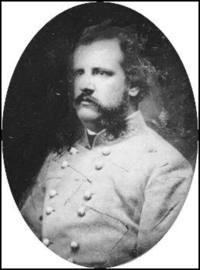The Joy and Sadness of Archibald Gracie
 Brigadier General Archibald Gracie was an unlikely Confederate general: a New Yorker by birth and pedigree. Gracie’s family was prominent in New York City from the Colonial era on.
Brigadier General Archibald Gracie was an unlikely Confederate general: a New Yorker by birth and pedigree. Gracie’s family was prominent in New York City from the Colonial era on.
Gracie received his education at West Point, graduating in 1854. His time in the Old Army was uneventful, and he resigned in 1857 to take a position with his father’s firm as an agent for Baring Brother’s bank in Mobile, Alabama. Once there, he quickly rose to become president of the Baring’s Bank of Mobile. Gracie also made an impact on his community, joining the local elite in the Washington Light Infantry, becoming its captain, and also meeting and marrying a local girl from one of the city’s prominent families. By the time of the Secession Crisis, young Gracie had become “native.”
So, when called upon Governor Andrew Moore to seize the United States Arsenal at nearby Mount Vernon, Gracie unhesitatingly moved his men to take the property. When word of his action reached New York, he was burned in effigy.
Gracie became the major of the 11th Alabama Infantry and served a brief stint in Virginia during the Peninsula Campaign before being sent to take command of a brigade at Chattanooga as colonel. Shortly thereafter, on November 6, 1862, Gracie was promoted to brigadier general at the age of 29. Gracie’s command would spent the better part of the following year in Garrison duty in East Tennessee before being ordered to Chattanooga again to join the Army of Tennessee in time to fight at Chickamauga, where his unit suffered heavy losses in several charges up Snodgrass Hill. Fortunes now took Gracie’s brigade with James Longstreet when Longstreet left Chattanooga in early November of 1863; that finally landed him back in Virginia during the siege of Petersburg.
Life was dreary for Gracie and his men in the muddy trenches, but it brightened for him on his birthday, December 1, when he learned of the birth of a daughter earlier that day.
The following day, Gracie’s life ended.
“General Gracie was standing in the rear of our second line of earth works looking through his field glasses,” wrote the Color Bearer of the 43rd Alabama, “when a cap shell from the Federal battery struck the embankment immediately in front of him. . . .” The blast killed Gracie and several others standing near him.
General Lee wrote of the death of Gracie, whom he had known at West Point: “The death of General Gracie was a great grief to me. He was an excellent officer and a Christian man . . . . He had just received a telegram announcing the birth of his daughter and expected to visit his wife the next day. Our loss is heavy. . . .”
Interesting article. Also interesting that the arsenal was seized before Alabama seceded.
Outstanding profile. Gracie Mansion (the Mayor’s residence in New York City) is the old family home. His namesake grandson survived the TITANIC sinking in 1912.
Namesake son was on Titanic, not grandson.
There is also a story, which is easy to confirm as I have done, that Gracie’s command was visited by R.E. Lee at Petersburg and Lee strayed out into a dangerous position while observing the Union line. The other officers hesitated to urge Lee to move from danger — who would speak in such a way to Lee? — but Gracie wordlessly inserted himself between Lee and the enemy until Lee noticed Gracie and removed himself from danger.